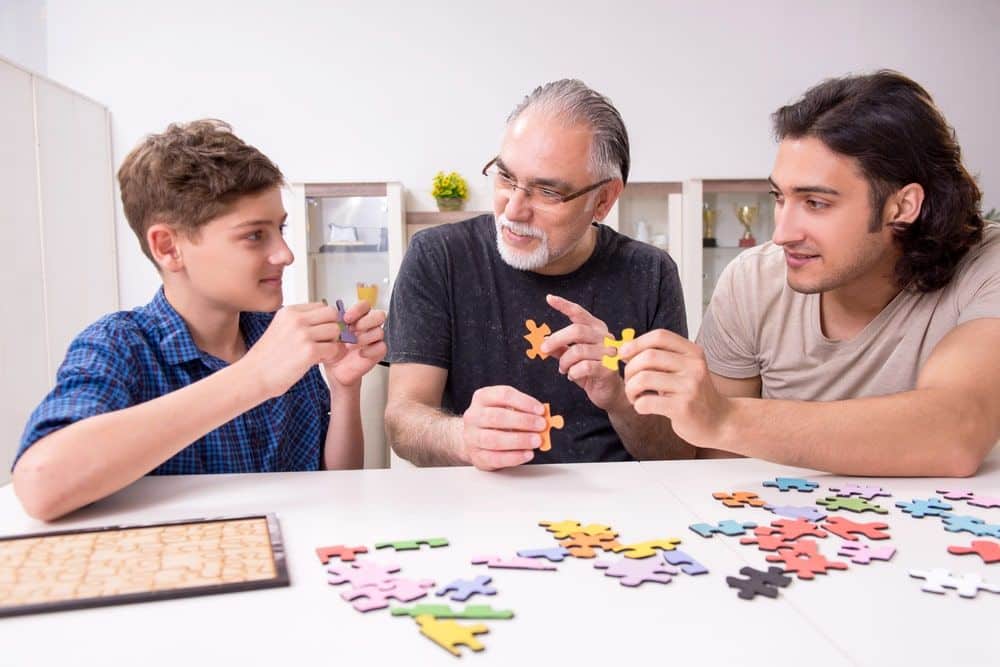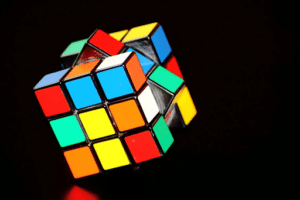Are you looking for an exciting evening that might boost your intelligence?
Then you want to book an escape room!
After all, as a fundamental part of human culture, the ability to think creatively in the face of challenges is in high demand.
Solving puzzles like those you might encounter in an escape room has been shown to improve your mood, adding to the already compelling evidence that these games are among the most enjoyable experiences money can buy.
According to a study, the neurotransmitter dopamine (which controls our mood) is “released” when we solve puzzles and celebrate that “Aha!” moment. It’s no surprise that escape rooms are so popular.
But, what are puzzles good for in the grand scheme of things? Keep reading, and we’ll uncover the mysteries behind the benefits of puzzles!
7 Awesome Benefits of Puzzles for Adults
The objective of an escape room is to look for hints and solve puzzles, and this type of activity is a lot of fun for people of all ages to participate in. However, there may be more to escape rooms than just the fact that they are exciting activities. Brain health and function can see tremendous benefits from puzzles and riddle solving.
So how are puzzles good for your brain? Here are seven benefits of doing puzzles:
1. Puzzles Give Your Brain a Complete Workout
So, how do puzzles help the brain?
Different mental processes are managed by your brain’s left and right halves. Analytical and logical thought are handled by the left side of your brain, while the right deals with creative thinking. You are giving your mind a thorough workout session as you use both sides of your brain to solve a puzzle.
2. Puzzles Make You More Attentive to Details
If you are running from a zombie apocalypse, it pays to notice minor details when putting together a puzzle. You should practice looking for the slight variations in color or shape that will allow you to see the puzzle’s bigger picture. The ability to notice and record minute details is helpful in many contexts, including the workplace. When we double-check our work by crossing our “t’s” and dotting “i’s,” our quality improves across the board.
3. Puzzle Give You Better Visual-Spatial Reasoning
To complete a puzzle, we must examine its parts and determine their proper places within the whole. Regular practice with mind games like jigsaw puzzles strengthens our capacity for abstract thought.
Now that we know that they improve our visual-spatial skills, are jigsaw puzzles good for your brain?
Putting together a puzzle is a great mental exercise that helps with focus, short-term memory, and solving problems. Scientific research indicates that engaging in mental activities like jigsaw puzzles can boost memory and spatial awareness. You can stimulate your imagination and improve productivity by treating the puzzle as a mental workout.
In addition, the same problem-solving tactics you apply to jigsaw puzzles can also be applied when you visit an escape room. Instead of playing at home, why not get out there and train your brain while experiencing the action? Solve thrilling murder mysteries, survive zombie apocalypses, and more in real-time at Paranoia Quest!”
4. Puzzles Can Boost Your IQ
Ok, so bottom line, do puzzles make you smarter?
We’ve already covered how solving a puzzle is an excellent mental workout! We can exercise and develop different parts of the brain by using them in novel ways, such as when we work through and solve puzzles.
It doesn’t take a genius to figure out that puzzles boost our intelligence because they force us to focus, remember, learn new words, and use logic. In fact, figuring out puzzles can increase your IQ, according to research conducted at the University of Michigan.
Increasing our originality, recall, and stress-management skills are some of the massive benefits of puzzles. If even basic puzzle-solving can improve cognitive performance, imagine what an hour in an escape room can do for your brain.
5. Puzzles Improve Problem-Solving Skills
Do puzzles help your brain solve problems?
Regarding problem-solving skills, there is nothing better than gathering a few puzzles, sitting them in front of you, and setting a time limit. An easy way to get your fix is to jump into an escape room scenario.
One reason is that you have limited time to work with, so you must contribute to the solution as efficiently and quickly as possible.
Moreover, the challenges you face in an escape room will vary from game to game, keeping you on your toes and eager to find a solution.
Since you are constantly being asked to think critically and analytically, you will see an immediate uptick in your problem-solving ability.
Once again, these are transferable puzzle-solving skills that can be put to use beyond the confines of the escape room, in this case, the workplace. You train your brain to be strategic and resilient by figuring out what a question is asking, discarding “red herrings,” and trying positive tactics until one works. You can use escape rooms to train your brain to think in new ways when the old ways don’t work. They set you up with ideal circumstances that demand you pause, readjust, and go for a second attempt as necessary.
6. Puzzle Can Help Delay Dementia and Alzheimer’s
Keeping your mind active with puzzles has benefits beyond just preventing cognitive decline in old age, such as a reduced risk of developing dementia or Alzheimer’s disease.
Scientific research indicates that people with Alzheimer’s disease can slow the progression of the disease by engaging in mentally stimulating activities like solving puzzles. It helps new nerve cells develop and strengthens existing connections between existing ones.
The likelihood of developing Alzheimer’s disease has also been linked to the amount of time a person has been solving puzzles. So, you should incorporate puzzles into your life as soon as possible. You can start taking care of your brain at any age.
7. Puzzles Can Improve Your Mood
We’ve already touched briefly on the puzzle benefits that affect mood. Puzzle-solving has been shown to increase dopamine release in the brain. This chemical messenger controls feelings of well-being and optimism. It also impacts cognitive processes like learning, memory, focus, and drive.
Dopamine is released whenever a puzzle is solved, or a piece is correctly placed. This gives us the confidence to keep pushing ourselves. As you progress through an escape room and complete puzzles, your brain registers your success and rewards you with a surge of dopamine. Overall, one’s disposition improves as a result!
Take Puzzle Solving to the Next Level with Paranoia Quest
Paranoia Quest offers a variety of exciting escape room scenarios, perfect if you’re looking to tap into the benefits of puzzles in an exciting environment! Book your reservation for an escape room in Atlanta or one of our Buford locations by visiting our website.




